Related Research Articles

The Ministry of Land, Infrastructure, Transport and Tourism, abbreviated MLIT, is a ministry of the Japanese government. It is responsible for one-third of all the laws and orders in Japan, and is the largest Japanese ministry in terms of employees, as well as the second-largest executive agency of the Japanese government after the Ministry of Defense. The ministry oversees four external agencies including the Japan Coast Guard, the Japan Meteorological Agency and the Japan Tourism Agency.
The Cabinet of Ministers of Ukraine, commonly referred to as the Government of Ukraine, is the highest body of state executive power in Ukraine. As the Council of Ministers of the Ukrainian SSR, it was formed on 18 April 1991, by the Law of Ukrainian SSR No.980-XII. Vitold Fokin was approved as the first Prime Minister of Ukraine.

The ministries of Poland are the various departments performing functions implemented by the Polish government. Each ministry is headed by a governmental minister selected by the Prime Minister, who sits in the collective executive Council of Ministers. The current competences and regulations of the ministries were established under a series of central administrative reforms carried out by prime ministers Józef Oleksy and Włodzimierz Cimoszewicz between 1996 and 1997. Under legal regulations, the cabinet can create, combine, or dissolve ministries, with the Prime Minister determining the scope and responsibilities of ministers. The number and range of ministries has varied throughout the past.
The Council of Ministers of the Republic of Colombia is composed of the most senior appointed politicians of the executive branch of the Government of Colombia. Members of the Cabinet are generally the heads of a Ministry Department. The existence of the Cabinet dates back to the first President Simon Bolivar. These members were appointed in order to advise the President and are therefore required to assist him in his duties as stated by the Colombian Constitution.

The Ministry of Transport, Mobility and Urban Agenda (MITMA), traditionally known as the Ministry of Development (MFOM), is the department of the Government of Spain responsible for preparing and implementing the government policy on land, air and maritime transport infrastructure and the control, planning and regulation of the transport services on this areas. It is also responsible for guaranteeing access to housing; urban, soil and architecture policies; planning and controlling the postal and telegraph services, directing the services related to astronomy, geodesy, geophysics and mapping, and planning and programing the government investments on infrastructure and services related to this scope. The Ministry's headquarters are in the New Ministries government complex.

The first Azarov government was Ukraine's cabinet from its appointment on March 11, 2010 until its dissolution on December 3, 2012. It continued to serve as a caretaker government until 24 December 2012, when the second Azarov government was appointed by president Viktor Yanukovych.
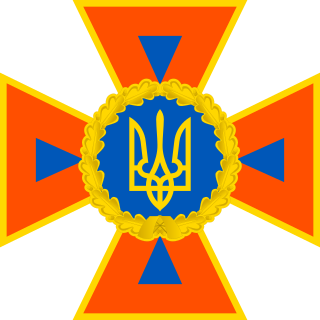
The State Emergency Service of Ukraine, until December 24, 2012 named the Ministry of Emergencies of Ukraine is the main executive body tasked with carrying out state policy in the spheres of civil defence, rescue, creating and managing the system of insurance fund documentation, utilization of radioactive wastes, protection of population and territory in emergency situations, emergency prevention and response, liquidation in the aftermath, and the Chernobyl catastrophe.

The Ministry of Energy is the main body in the system of central government of Ukraine responsible for realization of electric power-generating state policies; nuclear-industrial, and oil-gas complexes often referred simply as the Fuel-Energy Complex.
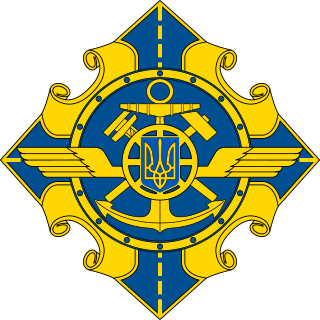
The Ministry of Infrastructure of Ukraine functions as the main executive body that controls Ukraine's transportation infrastructure including roads, trains, and communications. The department is based on the former Transport and Communications Ministry and also oversees the implementation of government tourism policies.

The Fokin Government was the second Cabinet of Ministers appointed in independent Ukraine (1990-1991) that was approved following the ousting of the Masol's government due to the 1990 Kyiv's student strike.
The Ministry for Development of Economy and Trade is the main authority in the system of central government of Ukraine responsible for formation and realization of state economic and social development policies ; regulation of consumer prices; industrial, investment and trade economic policies; development of entrepreneurship; technical regulation and security of consumer rights; inter-agency coordination of economic and social cooperation of Ukraine with the European Union. In 2019-2020 it also encompassed functions of the Ministry of Agrarian Policy and Food.
The Ministry of Culture and Information Policy (MCIP) is the main state authority in the system of central government of Ukraine responsible for ensuring the informational sovereignty of Ukraine, in particular regarding the dissemination of socially important information in Ukraine and beyond, as well as ensuring the functioning of state information resources and country's cultural development and history preservation. It is fully based on the former Ministry of Culture and Tourism. The Honcharuk Government merged the Ministry of Youth and Sports, established on February 28, 2013, and the Ministry of Culture (MinCult), established on December 9, 2010, into the Ministry of Culture, Youth and Sports. But its succeeding Shmyhal Government undid this merger, separating the Ministry of Youth and Sports into a separate body, and the Ministry of Culture, Youth and Sports on 23 March, 2020 will be renamed the Ministry of Culture and Information Policy, joining the Ministry of Information Policy, which operated from 2 December 2014 to 29 August 2019.
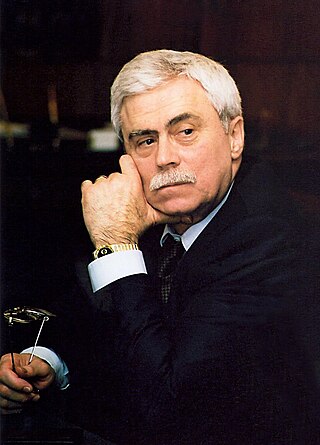
Leonid Semenovich Shkolnick is a Ukrainian scientist, author, government administrator and academic who has been a researcher at the Academy of Technological Sciences of Ukraine since 2003,

The second Azarov government was the government of Ukraine from 24 December 2012 to 28 January 2014. It was dissolved amidst the Euromaidan protests. The ministers (except Prime Minister Mykola Azarov who was replaced by Deputy Prime Minister Serhiy Arbuzov, continued briefly as a caretaker government. On 27 February 2014 Ukraine's parliament approved a resolution to formally dismiss the government.
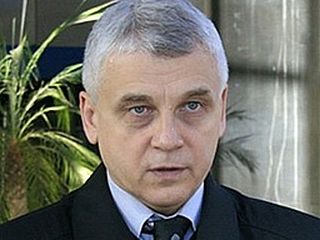
Valeriy Ivashchenko was the Deputy Minister of Defense of Ukraine in 2007–2009, and the Acting Minister from 2009 to 2010. He served as a colonel stock.
The ministries of the Ukrainian Soviet Socialist Republic were central bodies of state administration of the Ukrainian SSR as republican ministries of the Soviet Union. Among other central bodies of state administration there also were committees, state committees, and other agencies. After World War II in 1946 ministries uniformly as throughout the rest of the Soviet Union replaced the existing People's Commissariats. The ministries were part of the Council of Ministries of the UkrSSR until 18 April 1991 when the latter was reformed into the Cabinet of Ministries of the UkrSSR.
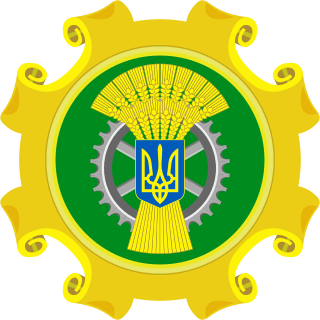
The Ministry of Agrarian Policy and Food is the central executive authority of Ukraine in charge of country's agro-development. It is one of the oldest government agencies of Ukraine. On 29 August 2019 the ministry's function were taken over by the Ministry of Economic Development, Trade and Agriculture. On 17 December 2020 the ministry was resurrected.
The Ministry of Industrial Policy of Ukraine is a former government ministry of Ukraine; it was the main body in the system of central bodies of the executive power. It was created from the former Ministry of Economy and initially was created as Ministry of Machinebuilding, Military-Industrial Complex and Conversion in 1996 and merged with the Ministry of Economic Development and Trade in March 2014 with headquarters in Kyiv.

Ministry of Youth and Sports of Ukraine is a government of Ukraine ministry established on 6 June 1991 after reorganization of the Soviet State Committee of the Ukrainian SSR in affairs of youth and sports. As a ministerial government department, it exists with some breaks since 1991. It was reestablished again in 2013 by splitting away from the Ministry of Education and Science where it existed as its subdepartment in 2010–2013.

The State Agency for Fisheries was established to implement state policy in the fishing industry of Ukraine. From 1994 to 1997 it served as a governmental ministry in the Cabinet of Ukraine.
References
- ↑ Economic encyclopedia. "Academiya". Kyiv 2002 ISBN 966-580-074-4
- ↑ Ukraine parliament appoints Markarova, Friz ministers, UNIAN (22 November 2018)
- ↑ Cabinet decides to unite Industrial Policy Ministry and Economy Ministry, Kyiv Post (March 28, 2014)